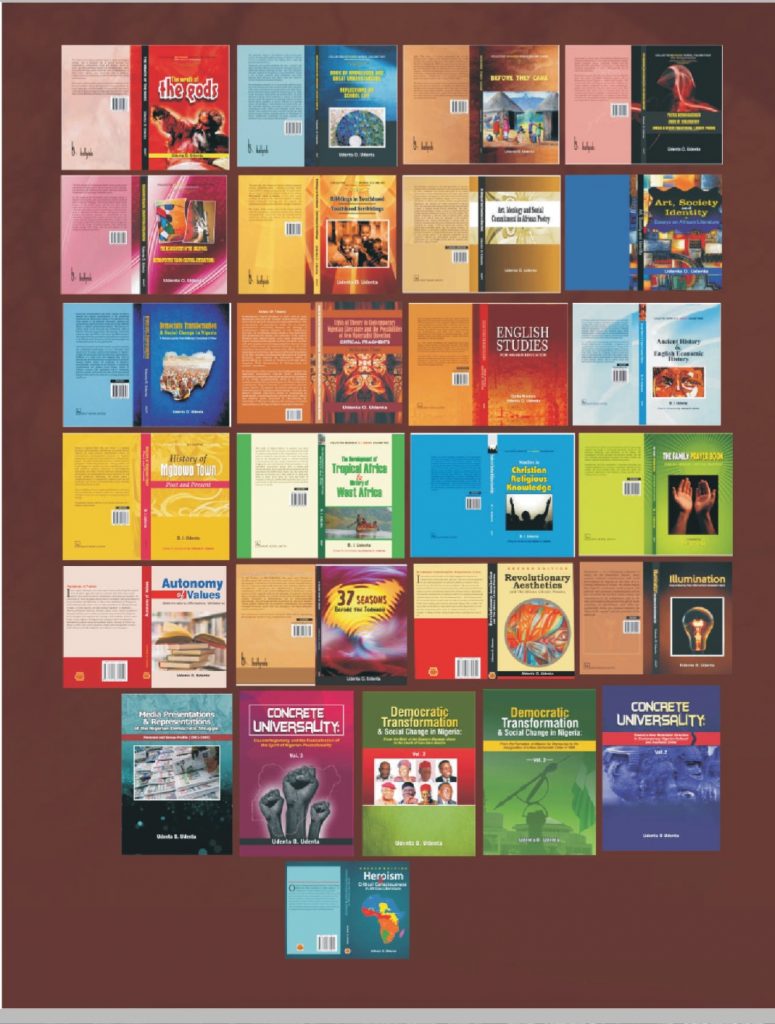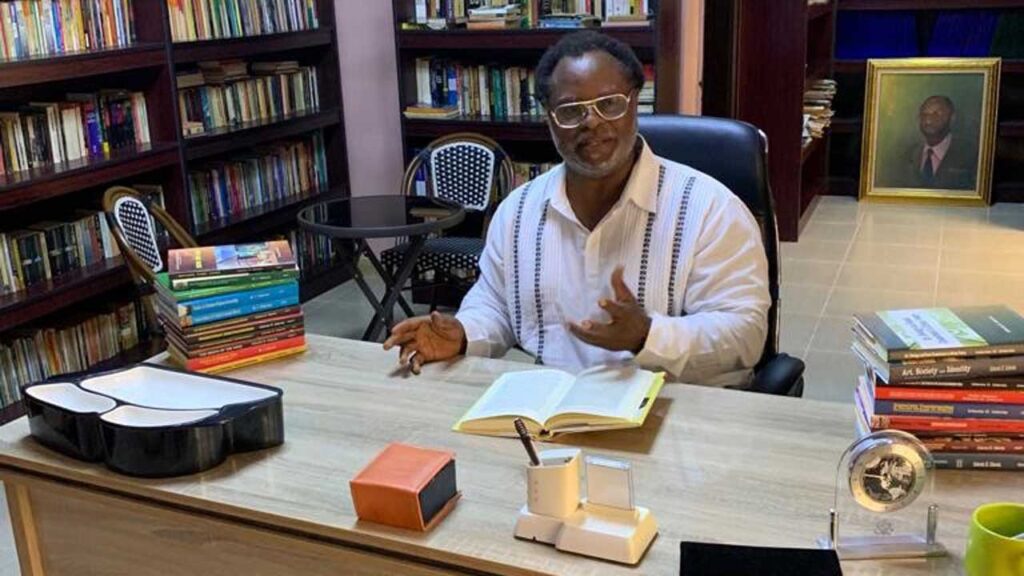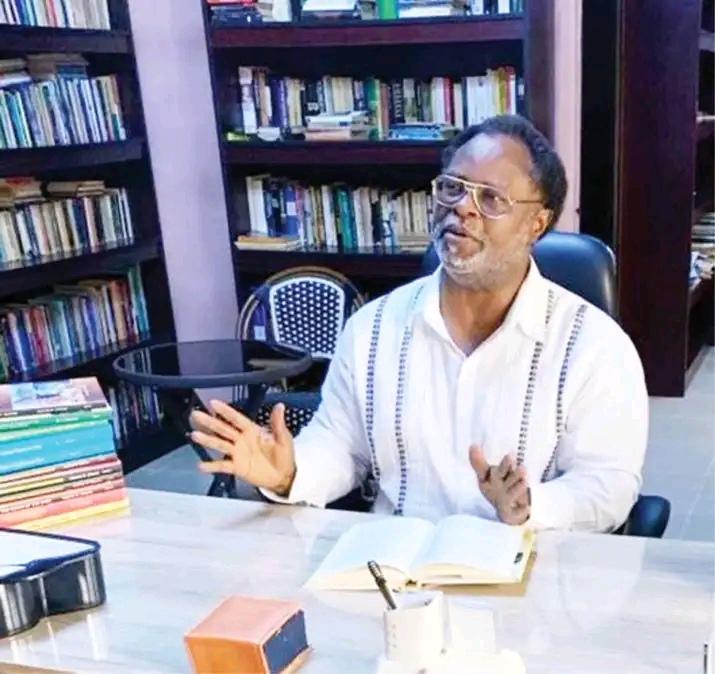By Law Mefor
For more than a decade, Professor Udenta O. Udenta and I have walked closely together. This September, he will turn 60 and enter the sixth floor of life. So, I thought it was appropriate to look back on his extraordinary life and great intellectual outputs and contributions as a creative mind and political thinker. Udenta is a well-known, bright, and erudite public intellectual whose written works and other social and cultural contributions are appreciated not just by academic audiences and readers but also by society at large. He is indeed a consummate and profound intellectual of uncommon hue.
Udenta has further cemented and reinforced his place among the sages in the creation of knowledge as a thinker, theorist, and—more importantly—as part of those who have put theory into praxis with his epochal presentation of 21 volumes this September. The 21 works span a wide range of subjects, including politics of course, but also prose, poetry, culture, and literary criticism.
Three of the 21 books with Udenta’s name now on the spine, namely ‘Art, Society, and Identity’, ‘Arts and Social Commitment in African Poetry’, and finally ‘Revolutionary Aesthetics and the African Literary Process’, especially qualify as his magnum opus. These writings present Professor Udenta Udenta as a Marxist scholar, philosopher, and theorist who supports welfarism rather than the strict state control of all resources and means of production as the traditional Marxists advocate.
Udenta, in contrast to most other intellectuals, is largely motivated by praxis and practicality, i.e. knowledge applied to assist society rather than knowledge for its own sake. He has always been preoccupied with the HOW question because of this. Philosophers have “interpreted the world, what remains is changing it” as iconic philosopher Karl Marx would put it. Udenta thinks that the questions of “what” and “why” have been fairly resolved. What is still unclear is HOW society will address the plethora of issues that have previously been discovered and considered.

If one takes a closer look, it is obvious that Nigeria’s issues are all well-known. The nation’s seemingly unsolvable issues have been thoroughly discussed and put in context since colonial times, through the military interregnum, which began with the first military intervention in January 1966, to the variegated civilian governments, and up to the present. However, successive governments have fallen short in their efforts to address the issues that have since been noted. Shockingly, governance failings in Nigeria and all of Africa have been getting worse over time.
Each succeeding government performs worse than the one before it and seems to be led by toxic leaders. Toxic leadership simply refers to a leader who leaves a place worse than when he found it. According to Udenta, the reason for the failure in leadership and nation-building is a lack of understanding of HOW as a result of the incorrect diagnoses and application of the incorrect solutions. Udenta’s views and deeds serve as a link between theory and practice for the reason that he is preoccupied with the HOW question.
His experience mentoring many inspired him to co-found The Abuja School of Social and Political Thoughts (TAS), a bimonthly gathering place for intellectuals of all stripes to discuss the state of the nation and global affairs and suggest answers. The monthly Mbari Forum of the Association of Nigerian Authors (ANA), which takes place at the Maman Vatsa Writers Village in Mpape Abuja monthly, was likewise revitalised and given fresh impetus by Udenta.
His library holds up well against a school library in comparison. It’s hard to determine whether Udenta’s first love is his beautiful wife, his adorable kids, or the mountain of books that fuels his encyclopedic mind and knowledge fountains.
Before we eventually met, I had read about, heard from, and observed Professor Udenta in the mainstream media and on social media, like most curious intellectuals. I had met him in person at the Institute for Peace and Conflict Resolution in Abuja. Then, the controversy surrounding the Umaru Yar’Adua Presidency was at its height. The amiable President’s deteriorating health and eventual demise prompted the National Assembly to use the avant-garde theory of necessity at that point. It was this second meeting that was more purposeful and lasting and launched our intellectual exchange on a sustained basis.
He then practically screamed alone, challenging the circling vultures to leave Yar’Adua alone. Nobody was certain of the then-president’s true condition at that moment because it was cloaked in secrecy and held in the cabal’s frigid hands. Udenta, who is usually courageous and audacious, confronted the alleged cabal and assisted in preventing what had the potential to snowball into a major national tragedy and cataclysmic catastrophe.

Since then, we have remained steadfast in both good and strange times. He is an easy target in any audience thanks to his seductive language, bombastic eloquence, ability to infuse his writings and speech with ideological clarity, and depth of knowledge.
No matter one’s political views or ideological preferences, it is simple to discover Udenta to be a reliable friend, socially savvy, and intellectual collaborator. Though equally battling to hide the cerebral haughtiness and aloofness that go along with his degree of learning, he is socially astute and humble as well. He enjoys jazz and classical music very much and can give anything to see a live opera.
Udenta arguably has very few equals, making it difficult to classify him with other philosophers and thinkers of the present or the past. He is a distinctive public intellectual since he is more of a hybrid and eclectic thinker who extracts and appropriates the best of ideas.
Contrarily, Prof Udenta rather shuns the austere life of Marxists; he shares Awolowo’s conviction that one cannot practice socialism in rags; he lives comfortably a life reflective of both tradition and post-modernity.
Like another classic African (Kenyan) writer who also inspired him, Ngũgĩ wa Thiong’o, Udenta is an advocate for the total decolonisation of African literature as well as the African person. To live the lives of truly free Africans who can hold their own wherever in the globe, he changed his first name Lawrence to Udenta.
The case study and mirror image of my upcoming book, ‘The Psychology of the African Writer and Public Intellectual’, is Professor Udenta Okwuchukwu Udenta, better known as Udenta O. Udenta. This work was inspired by my distaste for the lives of most African writers, who devote more of their time to neocolonialism’s progress rather than dismantling it. The book makes an effort to define what an African writer and public intellectual should be, providing younger writers and thinkers with some clue on how to avoid becoming the kind of Africans Franz Fanon wrote about in his book: ‘White man, Black skin’. Udenta is directly opposed to that.
Udenta is a fundamentally black thinker who both thinks and lives as a black man. His pursuits of a better Nigeria and his praxis have made him a patriot, statesman, nationalist, pro-democracy activist, and civil society key figure.
I join countless others in wishing the professor a happy 60th birthday. I am honoured to be counted among your acolytes.
Law Mefor, PhD, is an Abuja-based forensic and social psychologist. He is a fellow of The Abuja School of Social and Political Thoughts and can be reached via drlawmefor@gmail.com; Twitter: @Drlawsonmefor.

